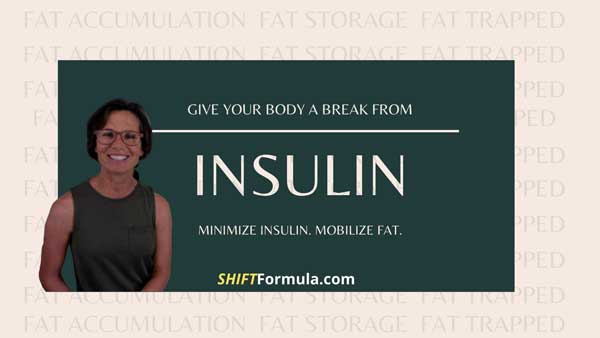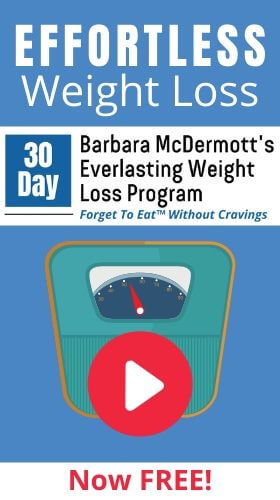What Exactly Is a Low Insulin Diet?
You’ve heard of many diets over the years but a Low Insulin Diet? That one has probably never crossed your path.
So, what does ‘low insulin’ mean and why would anyone be interested in such a thing?
The following is the transcription of a live sharing of ideas and positive outcomes for those who invest in and apply what can be described as a ‘low insulin diet’. By diet, we mean ‘way of eating’.
Not calorie restriction or rigid protocols.
The Insulin Lens
There is a way of eating that keeps a body from releasing large quantities of insulin.
Insulin, the body’s fat storage and blood sugar lowering hormone, is at the very heart of a person’s ability to either gain weight or lose weight and the ability to accelerate aging and health decline or do the complete opposite.
SHIFT is all about seeing food through the lens of INSULIN.
Keep insulin low, via a low insulin diet, then weight and health restore naturally.
The 3 Types Of Insulin Dependent Individuals
1.) The Lucky: Every human requires insulin. The body makes insulin. Insulin signals cells to take in glucose from the bloodstream. For the lucky folk, their pancreas releases the exact right amount of insulin for every blood sugar rise.
And their body responds so well to the insulin that they require very little. These folk probably don’t even realize the exquisite mechanism at play in their lives.
2.) The Unlucky: (Type 2 Diabetes) have developed a resistance to insulin so their body starts releasing more insulin or their pancreas is tired and underproducing insulin. Because the sugar accumulates in their blood as a result of inefficient insulin function, they are oftentimes prescribed to inject insulin to supplement their pancreas’ efforts.
3.) The Most Unfortunate: These individuals have suffered an auto-immune attack that has destroyed their ability to make any insulin. These individuals (Type 1 Diabetes) must rely on insulin injections their whole lives.
And then there is everyone else. Those I define as the lucky/unlucky folk.
They are lucky in that their insulin generation and release are working just fine (not diabetic) so blood sugar is in the normal range. But they are grappling with obesity, cravings, inflammation, and maybe blood pressure and some degree of heart disease.
If they only knew how to lessen insulin in their lives their struggles would soften if not solve completely. Regardless of health status, adhering to a low insulin diet leads to risk-reversal and restoration.
Watch: Is a Low Insulin Diet For You?
A Low Insulin Diet… Your Pathway To Forgetting To Eat
We’ve had a surge of terrific testimonials coming in.
People achieving great milestones. Right action going on. Outstanding health gains!
Health conditions like blood pressure, heart disease, brain degeneration, type 2 diabetes, cravings, obesity, chronic pain, inflammation ….are resolving, reversing, ceasing.
Getting off diabetes meds, hallelujah! Getting off blood pressure medications, double hallelujah! How about waistline finally reducing so you can wear a belt again? Hallelujah!
Comfortable living, right?
How about sweet relief from pain? How about crushing cravings? That’s worth three Hallelujahs…am I right?
And, I say it all the time and you might roll your eyes when I do…I get it…these outcomes are pleasantly achieved by Forgetting to Eat. It’s a thing and it can happen for you, too.
Forgetting To Eat Happens When You Apply What Can Be Described as a Low Insulin Diet
It’s a way of eating that lessens the amount of insulin, your fat storage hormone, so that you can access and burn body fat.
When you can burn body fat, inflammation softens and hunger diminishes significantly.
You are so not hungry that you forget to eat.
We help our clients ‘manage’ appetite which serves to eliminate all of these ‘lousies’ and more.
Add cancer to that list. Add fibromyalgia, add neuropathy, add Alzheimer’s and dementia. All of these conditions share a common variable. In fact, the underlying foundation is the same for all of them.
This is why SHIFT is so powerful. Because once you dial it (insulin) in and you understand how food stimulates or suppresses insulin, you own the key to your health and weight.
Any Food Philosophy Can Follow & Benefit From a Low Insulin Diet
It doesn’t matter what diet philosophy or protocol you follow …. vegan or vegetarian or paleo or pescatarian, carnivore or flexitarian or any of the many combinations or shades in between.
It doesn’t matter.
Whatever your food philosophy, it’s the underlying metabolic foundation, how the body responds to food choices, that drives your health.
It’s when we don’t know or turn a blind eye that we can get into trouble.
Even a moral approach to eating, which I had engaged in at one point, can lead us astray.
Our body’s metabolic principles don’t make adjustments for our moral principles.
Fat Releasing or Fat Accumulating Foods
Knowing how foods influence our body’s ability to be accumulating more body fat or releasing body fat is critical.
We can slip into a balance struggle. Becoming very good at one aspect of our energy system but unable to succeed at the balancing aspect.
My mind goes to the Seinfeld episode when Jerry is agitated and arguing with a car rental representative. He tells the person behind the rental counter, “You’re good at taking the reservations, but you don’t hold the reservation.”
Well, we are good at taking in energy (food) and we are good at holding the energy.
That’s the very problem for us. We are less good at releasing the energy. (Burning body fat)
And our ability to accumulate fat versus our ability to release fat depends upon one thing….the powerful, life-sustaining hormone. Insulin.
Our ability to accumulate fat versus release fat depends upon one thing. Insulin.

Insulin Is The Center Of Your Health Universe
My purpose on this planet is to teach anyone who wants to learn, how insulin impacts their health. And more importantly, how to make insulin work for them rather than against them.
It’s all about Right Action.
I know, without a doubt, that when you understand insulin, your health will do a complete flip.
It’s All About Blood Sugar and Insulin
We’re told blood sugar is only a problem when it gets too high. Then we are ushered into diabetes type 2.
But Blood Sugar Impacts EVERYONE
Blood sugar corrodes brain cells, blood vessels, joint tissue and nerves.
Blood sugar fuels cancer while insulin assists with the blood sugar distribution and body fat accumulation and cancer cell angiogenesis and blood vessel thickening.
I know. It’s a lot to take in. But that doesn’t excuse us from knowing it.
Blood sugar is simply glucose.
Where Does The Blood Sugar Come From?
Our body makes glucose as needed.
However, the primary blood sugar/glucose overwhelm comes from the carbohydrates we eat.
Now, let’s be clear, carbohydrates are such a broad category of foods that we are prone to oversimplify by labeling.
Carbohydrates are also the category of foods that we attribute feelings of love toward.
The good carbs.
The bad carbs.
The complex carbs.
The simple carbs.
The starches, the sugars, the natural, the organic, the right carbs or the wrong carbs.
Carbohydrate IS Blood Sugar
Every gram of any kind of carb, regardless of whether it is pure or processed, digests directly to glucose…blood sugar. (With exception of fiber which travels straight through us and fructose which the liver converts to triglycerides.)
Every bit of carbohydrate we eat ends up in our bloodstream.
We hear phrases like, “carbs impact blood sugar” with emphasis on the verb impact.
The actuality is that carbohydrate becomes or IS blood sugar with emphasis on the linking verb “is”.
The direct link between any carbohydrate and blood sugar needs to be common knowledge. This is critical health information.
The Misguided, Carbohydrate Lopsided Diet
The last two decades we’ve been misguided to consume a carbohydrate lopsided diet.
A carbohydrate diet is a blood sugar diet. A carbohydrate diet is a glucose diet. (and remember, your body already makes its own glucose)
Fat phobias and plant-based platitudes have us tipping the balance in favor of more and more carbohydrate. Blood Sugar.
And the consequence is more and more insulin release or high insulin levels. It’s not a wonder we’re all inflamed and in pain.
And, to those adhering to extreme versions of carbohydrate-focused eating, lots of plants, little fat, who are struggling with debilitating M.S. or high cholesterol or declining cognitive function, or chronic pain, or a waistline that just won’t resolve, you may be depriving your cells of life-sustaining fat while overwhelming your cells with too much glucose.
With too much glucose comes too much insulin.
The Diabetes & Weight Gain Connection
Diabetes is a condition of glucose overload in our bloodstream.
And with the glucose overwhelm, which is any carbohydrate amount above 4-5 grams, insulin is released to open up the body’s cells to allow the sugar to move from the blood into the cells and tissues.
Most science lessons end there.
They fail to mention that when you take in more carbohydrate-glucose than your body needs some gets used for immediate energy and if there is room, some gets stored in the muscles and liver.
The excess gets distributed. Distributed. Sugar Distribution.
Your Excess Blood Sugar Becomes Stored Fuel
Where do you think the excess blood sugar goes?
It mainly goes around your waist where it is converted to fat. Remember, body fat is fuel…stored fuel.
Insulin regulates sugar fuel distribution. It’s main role is to clear the sugar from the blood.
But few of us realize the blood sugar ends up as belly fat.
And even fewer of us connect the dots that our deteriorating body…brain cells, joint tissue, nerves, and blood vessels, is the direct result of blood sugar dispersal all throughout our body.
We literally corrode from the inside out.
Insulin Assists With Growing, Expanding, and Thickening
Insulin also assists with growing.
An anabolic hormone, insulin stimulates an established cancer cell’s growth by promoting angiogenesis, and the thickening of blood vessels.
Think increasing blood pressure and hardening arteries.
Anyone who has to take insulin injections may at first note a reduction in blood sugar but it comes with other consequences. Some notice a thickening of their skin over time. They’ll certainly note a thickening of their waistline.
Middle-agers, me (age 58) and anyone out there over the age of 40, certainly are not wanting to grow any more.
Reducing our fat storage and tissue growth hormone is a common sense action.
Young people, children especially, indeed want to grow, right? Kids require an appropriate measure of carbohydrate and insulin….but adults?
Adults need less, far less. A little sarcasm here… if you want to grow in your late years, you want to expand, you want to thicken, you want to get heavier, you want to support cancer cells’ angiogenesis then eat a carbohydrate-lopsided diet.
What Happens When Your Insulin Levels Are High?
Keep that insulin level rising up and you will continue to grow.
But when you quiet insulin, the exact opposite happens. Consider it a “Low Insulin Diet”.
When you shift from an insulin high diet to insulin quiet diet, every condition softens or completely solves.
High Insulin Shuts Down Body Fat Burning
When insulin levels are elevated, body fat burning is disabled. Access to body fat stores is denied.
Hormones are powerful catalysts. When insulin is in charge only sugar burning is allowed.
Only when blood sugar is cleared does insulin quiet and body fat is made accessible again.
Some people have been so trapped by blood sugar and insulin that their body hasn’t enjoyed fat burning in decades.
Other High Insulin Related Health Issues
Okay. Let’s run through some odds and ends.
Blood Pressure
When insulin levels are elevated, blood vessel linings thicken. A thickened blood vessel means a narrower passageway for blood flow.
Also, when insulin levels are elevated, your body holds on to fluids more readily. The dual consequence of narrower blood vessel passage and greater blood fluid volume is a recipe for disaster. That’s lots of pressure!
I had a woman get off blood pressure medication in two weeks of Shifting. In two weeks!
Because she shifted to a low insulin diet, her insulin levels dropped, waistline and fluid started to release. Her rings were looser, her shoes more comfortable, she even noticed her bra fit was easier and body pain softened.
The waistband around her pants doesn’t have to be elastic anymore and she’s saving a lot of money because not only is she off blood pressure medications, but reduced her diabetes meds, too.
And she doesn’t have to worry about that feeling of light-headedness or sudden dizziness.
You know, blood pressure impacts quality of life and can be problematic to say the least.
Diabetes
Same thing with diabetes, the whole hyperglycemia, hypoglycemia rollercoaster.
It’s the blood sugar highs followed by lows that trigger sudden fatigue, irritability, instability and demoralizing cravings. And insulin is always involved.
How Carbs Turn Into Fat
You know why insulin is all about waist weight?
Insulin ensures carbohydrate ends up around your middle. Where will we carry excess fuel? At our center of gravity.
So, the carbohydrate becomes glucose in your bloodstream. Blood sugar. It gets delivered to cells for use. Insulin signals cells to take it in. And some is distributed to the liver and muscles where it’s stored as glycogen if and only if there is space available.
If we are in a weight crisis we’re most likely at glycogen capacity. No storage space available.
So insulin shuttles the surplus blood sugar into adipose tissue where it converts to fat.
Insulin shuttles surplus blood sugar into waistline adipose tissue where it converts to stored fuel….belly fat.
And with any blood sugar rise or glucose and insulin surge we get a ‘pleasure’ hit, a little dopamine-endorphin rush.
That’s why when little kids eat something glucose-rich they start dancing around.
Pageant Crack.Sugar Strut. And then the subsequent Carb Coma.
We adults experience the same thing.
For us it’s socially frowned upon to run around and then fall into a slump or slumber.
So we discreetly try to keep our heads from dropping onto our work station keyboard. And we find ourselves continuously reaching for the next hit. Grazing.
Plus, the more regularly we consume glucose-rich snacks the more glucose-rich snacks we need to achieve the same ‘high’.
Like any addiction, our body adapts by growing desensitized to it. It’s a slippery slope into consuming more and more and before we know it we’re in an insulin surplus trap.
How Does Insulin Cause Cravings?
How lovely it is to leave this sugar-burner cycle of insanity behind. Imagine the freedom of forgetting to eat.
You forget to eat when you’re not hungry because you’ve shifted to a low insulin diet. Setting up your body with less insulin means you can ‘dine in’.
You’re able to use up your body fat. Hooray!
And the dual aspect of insulin down and fat burning up brings along with it all kinds of victories.
Obesity resolves. Inflammation quiets. Heart Disease Resolves. Diabetes Ceases. Blood Pressure Normalizes. Trips to the pharmacy lessen. Bank account fattens. And cravings and food obsessing evaporate.
Blood Sugar. Insulin. They impact all of us. Get ’em down and your health turns around.
So, food for thought….consider a Low Insulin diet. Try it!
Thanks for listening. And until next time, Keep Calm and SHIFT On.
Listen To The Forget To Eat™ Podcast – Is a Low Insulin Diet For You?

About Barbara McDermott
Regarded as America's #1 Insulin Suppression Coach, Barbara is the co-founder of SHIFT Health & Wellness Solution, and the best-selling author of the groundbreaking book, ‘FOOD B.S.’, With SHIFT, Barbara brings common sense to nutrition, weight loss and health gain. Her refreshing, no nonsense approach to uncovering the truth using non-negotiable rules of science demystifies food and how to defeat chronic disease once and for all.




No comments yet.